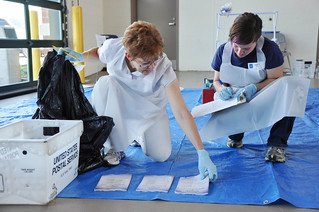
PREV ARTICLE
NEXT ARTICLE
FULL ISSUE
PREV FULL ISSUE
THE COLLECTIONS EMERGENCY RESPONSE TEAM
Bibliophiles and collectors of all stripes wake up in a cold sweat to the same nightmare - a sudden fire or flood damaging or destroying
their collection. On the 10th anniversary of Hurricane Katrina, it's good to know that professional help is available when disaster
strikes. This article highlights a SWAT team for museums and libraries that can swoop in to assist. -Editor
The American Institute for Conservation Collections Emergency Response Team, also known as AIC-CERT. Okay, it’s not quite as catchy as Ghostbusters. But for workers at cultural institutions, the AIC-CERT is a disaster relief A-Team, solving problems ranging from a a burst pipe to a tsunami. They can be the difference between saving a collection or losing millions of dollars and priceless cultural history. The AIC-CERT team was born out of an informal effort organized to help museums, libraries, archives and historic sites on the Gulf Coast in the wake of Hurricane Katrina, whose 10th anniversary is this year. Teams of volunteers were spending weeks at a time helping organizations assess damage and salvage collections. Afterwards, the Foundation of the American Institute for Conservation (FAIC), a national organization devoted to the preservation of cultural materials based in Washington D.C., decided to convene an official emergency response unit. In 2007 they trained an initial team of 63 people, adding another 42 members in 2011. There are conservators, archivists, curators and architects among their ranks with specialties ranging from care of furniture to paintings. The teams are distributed throughout the country, and can be reached by a 24-hour hotline. They often work in a supervisory role, providing advice over the phone or by email, but also respond on the ground. Funded through donations and grants, their services are free. AIC-CERT crews have assisted in the aftermath of the Haiti earthquake, Hurricane Ike, and the Minot, ND floods. After Superstorm Sandy swept through New York, they established a temporary cultural recovery center in Brooklyn where teams of volunteers cared for over 3,000 works of art, many from individual artists whose studios and storage areas were flooded. Katrina was a “wake up call” says Barbara Moore, a 3D object conservator and AIC-CERT member and trainer who advises institutions on how to plan for disasters and teaches disaster response workshops. “I think it’s become much more real,” says Moore, who has taught workshops at the Metropolitan Museum of Art, the Los Angeles County Museum of Art, The National Museum of Natural History and the Smithsonian. While the general public may be drawn to dramatic tales of rescue, Moore and others interviewed for this story stressed that preparedness is key. Getting organizations to assess risk and create a comprehensive disaster plan is the most important step to emerging from a crisis with a collection intact. Taking steps as simple as compiling contact numbers and making connections with state and local officials is just as important as the actual response and recovery . The Ohr O’keefe Museum in Mississippi in Biloxi, MS is often cited as a success story—they transported many holdings to safe ground before Katrina’s flood waters arrived. To read the complete article, see:

Wayne Homren, Editor The Numismatic Bibliomania Society is a non-profit organization promoting numismatic literature. See our web site at coinbooks.org. To submit items for publication in The E-Sylum, write to the Editor at this address: whomren@gmail.com To subscribe go to: https://my.binhost.com/lists/listinfo/esylum All Rights Reserved. NBS Home Page Contact the NBS webmaster 
|
